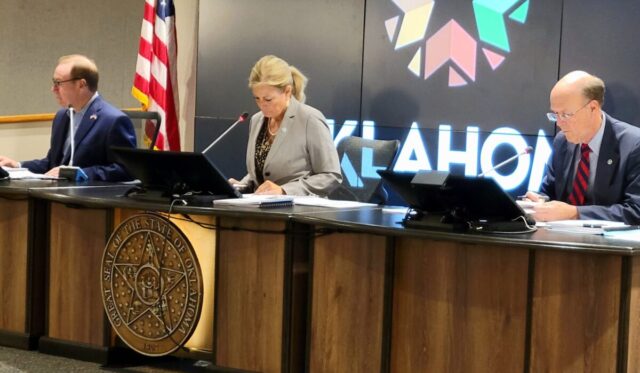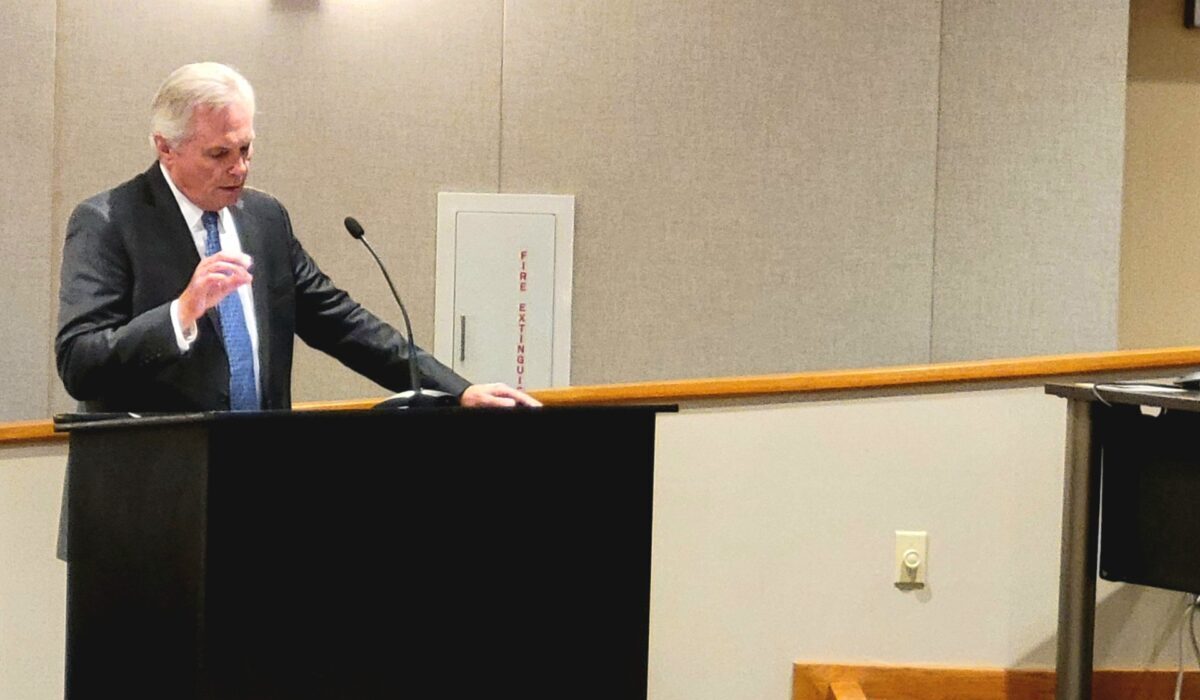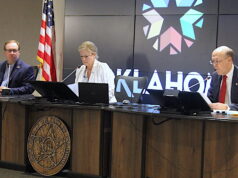
(Update: The Monday meeting of the Oklahoma Corporation Commission discussed below was postponed until 10 a.m. Thursday, Oct. 3. Late Monday afternoon, the Oklahoma Supreme Court declined to assume jurisdiction on the petition of Corporation Commissioner Todd Hiett discussed below. The following article remains in its original form.)
As the Oklahoma Corporation Commission holds a public hearing today on a $218 million rate hike proposed by Public Service Company of Oklahoma, two of its three elected members remain engaged in a legal battle before the state Supreme Court that has drawn three state lawmakers into the fray.
Meanwhile, as the regulatory body also considers a final element of a $126.6 million rate hike for OG&E, an Oklahoma law firm continues its contracted investigation into allegations of sexual misconduct by Commissioner Todd Hiett.
The accusations against Hiett, which surfaced over the summer, have changed the atmosphere of Oklahoma Corporation Commission meetings. Typically defined by detailed data and discussions on procedures and regulations, recent hearings have included inflamed language about Hiett’s drinking habits and allegations that he is prone to groping men.
Commissioner Bob Anthony has called upon Hiett to resign and was miffed that OCC staff set the parameters of the agency’s internal investigation, which is being led by attorneys Melvin Hall and Don Bingham of the law firm Riggs Abney.
On Aug. 7, Hiett resigned as chairman but said he had no intention to step down from the commission. Kim David, a Republican like Hiett and Anthony, was elected chairwoman. Stating she “would expect” the Riggs Abney investigative report about Hiett to be released publicly, David has largely stayed out of the fracas between Hiett and Anthony in an effort to keep the agency focused on matters coming before the commission.
But as the Oklahoma Corporation Commission prepares for action on the PSO and OG&E electricity rate cases, Hiett and Anthony remain locked in a bizarre legal battle.
Hiett attorneys: No mechanism for temporary replacement

Since the allegations against him surfaced, Hiett has claimed Anthony has been trying to influence the investigation into his actions by “exerting powers” not granted to commissioners by the Oklahoma Constitution. As a result, Hiett asked the Oklahoma Supreme Court to grant a writ of prohibition against Anthony to stop him from acting outside his constitutional authority as a commissioner and from engaging “in efforts to trample” Hiett’s rights.
Anthony, through attorney George Makohin, responded that Hiett failed to meet requirements for a writ, such as showing that Anthony has abused his judicial power by making critical comments of Hiett. The two men have clashed for years over rate cases, commission procedure and allegations that Hiett’s position on a bank board poses a conflict of interest.
“It appears the petitioner dislikes comments filed by Commissioner Anthony in the past,” Makohin wrote. “However, the mere filing of comments in dockets is not the exercise of judicial power, nor is it unauthorized by law.”
He also denied Hiett’s claim that Anthony had made demands on the Riggs Abney firm “designed to bully and intimidate their attorneys, and to push the investigation toward his predetermined outcome.”
Makohin noted the experience of Hall, an attorney since 1982, and Bingham, an attorney since 1977.
“It is difficult to imagine how these two attorneys with 47 years and 42 years of experience, respectively, would be ‘bullied’ or ‘intimidated’ by Commissioner Anthony, or anyone else, in the performance of their investigation,” he wrote.
Makohin also referenced an exchange between Hall and Anthony during the Aug. 20 Corporation Commission meeting when Anthony asked Hall if he had bullied him.
“Was I intimidating you?” Anthony asked.
“No, I have never had that feeling,” Hall said. “I’m fine.”
In a separate court action, Oklahoma House Reps. Kevin West (R-Moore), Tom Gann (R-Inola) and Rick West (R-Heavener) have sought a writ of prohibition from the Oklahoma Supreme Court to ban Hiett from voting on cases involving companies with direct knowledge of his “alleged criminal conduct.”
While it is not the only misconduct allegation facing Hiett, the man whom Hiett allegedly groped at a conference in Minnesota this summer reportedly works for a company regulated by OCC. A pair of Kansas Corporation Commission employees made written reports alleging that an “extensively intoxicated” Hiett repeatedly rubbed the man’s arm and crotch in a group setting. (Hiett has said he no memory of the incident due to his struggles with alcohol and that he is pursuing treatment.)
Since Hiett’s alleged misbehavior has become public, he has “continued to participate and vote in judicial cases involving regulated public utility companies whose employees/agents/representatives have direct knowledge of his alleged criminal conduct,” the legislators wrote in their petition filed Sept. 13.
Gann and the two Wests said they and others have filed formal complaints against Hiett at the Oklahoma Ethics Commission and the Council on Judicial Complaints regarding his violation of state ethics rules and the Code of Judicial Conduct. However, they said the complaint procedures are time-consuming and confidential. An attorney general’s opinion also has been sought.
“Having exhausted all other options, petitioners pray that this court will intervene to protect both petitions and the public interest generally from the severe injury of tainted judicial cases at the OCC collectively worth billions of dollars,” the three lawmakers wrote. “As an elected state officer, respondent cannot be removed from office except by impeachment of the Legislature. However, this court has the power to prevent further injury to petitioners and millions of other ratepayers by disqualifying respondent from and forbidding his participation in judicial cases at the OCC involving companies (…) with direct knowledge of respondent’s alleged criminal conduct.
“In the event, the respondent ‘does not remember’ all the victims and witnesses of his criminal conduct, petitioners pray the court disqualifies respondent from all judicial cases at the OCC, saving other parties from being forced to seek the same extraordinary relief petitioners have been forced to resort to here.”
In response, Hiett’s attorneys, Joe and Kate White and Melissa Hedrick, said the request by Gann and the Wests should be denied because it would effectively remove Hiett from his position as a duly elected member of the Corporation Commission.
“Petitioners direct this court’s attention to unproven and salacious allegations, rumors and innuendos to argue that Commissioner Hiett is required by law to ‘disqualify himself’ from further proceedings of the Corporation Commission — namely all ‘judicial cases involving Oklahoma Natural Gas Company, Oklahoma Gas and Electric Company and Public Service Company of Oklahoma,” Hiett’s attorneys wrote in a response filed Thursday. “In support, petitioners rely on anonymous statements, unproven allegations, classic hearsay and rank speculation.
“For instance, petitioners allege and insinuate that some individuals have not reported any alleged wrongdoing by Commissioner Hiett because they are using this information to have some sort of hold over Commissioner Hiett. They provide no support for this argument other than mere ipse dixit, which should be held insufficient to remove a duly elected commissioner from performing the duties prescribed to him by the constitution.”
They wrote that, in Clements v. Southwestern Bell Telephone, the Supreme Court held there is no mechanism to replace a commissioner temporarily, only a mechanism to replace one permanently.
A decision by the Supreme Court is pending.
Commissioners consider electricity rate cases for OG&E, PSO

The legal skirmishes come at a busy time for the commissioners.
In June, OG&E reached an uncontested settlement from its original $332.5 million rate request, which would have raised their customers’ average monthly residential bill by $19.02. The settlement dropped the proposed rate hike from a historic 13.85 percent, or $332.5 million, to $126.6 million. As a result, the proposed average monthly residential bill increase stands at $9.58.
Although awaiting final approval, the rate increase went into effect for OG&E customers in June.
The settlement did not include how OG&E charges rates to large customers — those using one megawatt of electricity or more — outside OG&E’s service area.
The Oklahoma Corporation Commission heard arguments on that issue Sept. 12 and took the matter under advisement.
Eric Turner, an attorney representing the Oklahoma Association of Electric Cooperatives, said OG&E is not charging its actual cost to serve the one-megawatt customers, which are mostly oil and gas operations. He cited state law, created by House Bill 2845 in 2023, that requires utilities to establish rates for one-megawatt customers and avoid unfairly shifting costs to residential customers.
“The matter should not be kicked down the road,” he said. “It should be resolved in this case.”
Tom Schroedter, executive director of the Oklahoma Industrial Energy Consumers group, said those costs also should not be picked up by industrial customers. He said information shows that about 11 percent of the electric bills charged to 636 large OG&E industrial customers inside the utility’s service area is going to subsidize the 31 one-megawatt customers outside the OG&E service area.
“The rates need to be fair for OG&E’s existing customers, not just for the one-megawatt customers,” he said.
Bill Humes, an attorney with OG&E, argued that HB 2845 does not apply because it deals with one-megawatt customers seeking service after Nov. 1, 2023, when the measure took effect.
“There is absolutely no expressed language in Subsection F that indicates the Legislature intended the provisions to be applied retrospectively,” he said. “OG&E argues, and the [administrative law judge] agrees, that the requirements of Subsection F are to be applied prospectively and do not apply to OG&E’s existing one-megawatt customers.”
If the Corporation Commission agrees with OG&E’s position, the proposed rates established in the settlement would remain the same. If it determines OG&E must set rates for its one-megawatt customers separately, then the new rate increase would be slightly lowered on other customers. AARP Oklahoma estimates the monthly impact on the residential rate increase would be a quarter, reducing the increase from $9.58 a month to $9.33 a month.
Similarly, the Corporation Commission is set to hold a hearing today on a proposed $218 million rate increase sought by PSO, which serves nearly 573,000 customers in the Tulsa area and other sections of Oklahoma.
“PSO is committed to providing customers with safe and reliable energy,” Matt Rahn, regional communications manager for PSO, said in an email. “To strengthen our grid and service, PSO filed a rate review in January 2024 with the Corporation Commission — a change of less than one penny per kilowatt hour for our average residential customer. This adjustment is crucial for us to enhance and safeguard our electric grid, comply with federal environmental standards and ensure our service remains both efficient and dependable.”
For the average PSO residential customer who uses 1,100 kilowatt hours per month, Rahn said the increase would be $15.84 a month, or 10 percent.
Sean Voskuhl, state director of AARP Oklahoma, said PSO residential customers could see their monthly bills increase at least $25 in a two-year period if this proposal and another proposed rate hike next year are both approved. PSO received approval for a rate increase last year that raised residential bills about $5 a month, and the company is proposing another increase next year that would raise residential bills about $7 a month. That rate increase would go toward PSO’s plans to purchase a natural gas combined-cycle generation plant in Jenks. If approved by the OCC, the facility would add 795 megawatts of long-term power to POS”s generation mix by June, which primarily includes renewable energy and natural gas, according to the utility.
The OG&E and PSO increases are significant, especially for Oklahomans, like senior citizens, who are living on a fixed income, Voskuhl said.
“We’ve gotten so many written comments that say, you know, ‘Our cost-of-living adjustment hasn’t kept up with our increased cost of food and utilities and prescription drugs,'” Voskuhl said. “We hear that message from a lot from older Oklahomans that, you know, a few dollars’ increase is a big deal to them, and I don’t think we should lose sight of that.”
(Editor’s note: Both PSO and AARP Oklahoma are charitable sponsors of the Sustainable Journalism Foundation.)





















